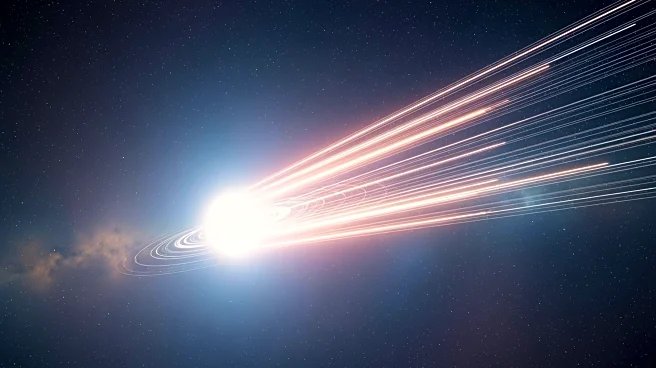What's Happening?
A research team led by astrophysicist Lukas Böhme at Bielefeld University has discovered that the solar system is moving more than three times faster than current cosmological models predict. This finding, published in the journal Physical Review Letters,
challenges the established standard model of cosmology. The team analyzed the distribution of radio galaxies, which emit strong radio waves, using data from the LOFAR telescope network and two additional radio observatories. Their analysis revealed a deviation exceeding five sigma, indicating a statistically significant result. The study suggests an anisotropy in the distribution of radio galaxies that is 3.7 times stronger than expected, prompting a reconsideration of fundamental assumptions about the universe's large-scale structure.
Why It's Important?
This discovery has significant implications for cosmology, as it questions the standard model's assumptions about the universe's structure and evolution. If the solar system is indeed moving at this unexpected speed, it could mean that the distribution of matter in the universe is less uniform than previously thought. This challenges the current understanding of the cosmos since the Big Bang and may lead to new theories about the universe's formation and behavior. The findings also highlight the importance of new observational methods in reshaping scientific understanding and underscore the vast unknowns that still exist in cosmology.
What's Next?
The research team suggests that further studies are needed to explore the implications of their findings. This could involve re-evaluating the distribution of radio galaxies and other cosmic structures to better understand the universe's large-scale dynamics. Additionally, the scientific community may need to develop new models that account for these observations, potentially leading to a paradigm shift in cosmology. The study opens avenues for more precise measurements and analyses, which could provide deeper insights into the universe's behavior and structure.
Beyond the Headlines
The discovery raises ethical and philosophical questions about humanity's understanding of the universe and our place within it. It challenges long-held beliefs and encourages a re-examination of scientific assumptions, fostering a culture of inquiry and exploration. The findings also highlight the role of advanced technology in expanding the boundaries of knowledge, emphasizing the need for continued investment in scientific research and innovation.
















